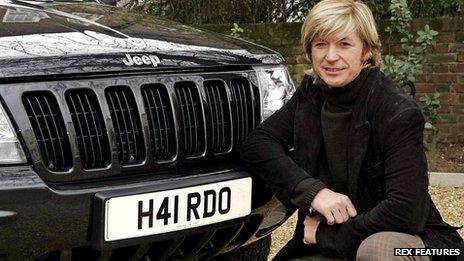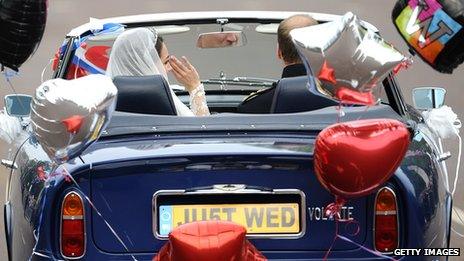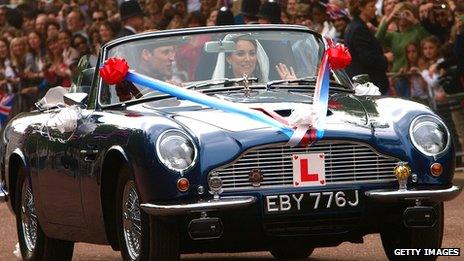Why do people still buy personalised number plates?
- Published
ofthedvlahandsthego12donregistrationtoheatherandgordonlogan.jpg)
If you squint this number plate almost says Gordon. Almost
Last year the UK's Driver and Vehicle Licensing Agency raised £67m from the sale of personalised number plates. But why do people still buy them?
Lord Alan Sugar has one: AMS 1. The Duke and Duchess of Cambridge drove away from their wedding with one that read JU5T WED and broadcaster Chris Evans has several.
But it's not only the rich and famous who buy personalised number plates. Despite the recent economic downturn, they are still big business.
Personalised plates are regularly used in films and television series to hint that a character is a braggart or an egomaniac or just a bit desperate for attention.
In the TV series The Persuaders, international playboy Brett Sinclair, 15th Earl of Marnock, drove an Aston Martin DBS with the number plate BS 1. In the 1964 Bond film Goldfinger, the villain had AU 1 on his 1937 Rolls Royce Phantom III Sedanca de Ville.
For the thousands of drivers who actually have personalised number plates, they are regarded as a statement of individuality or an investment. To many of the vast majority that don't have one they're an ostentatious waste of cash.
Retired businessman Robert Harverson, from Surrey, paid almost £250,000 for the registration 1 RH in November 2008. He went to the auction in Yorkshire intending to spend between £100,000 and £150,000 but recalls that - once there - he thought: "It's my initials, there's only one, so I've got to keep bidding."
He admits it is a kind of statement but no different to spending a lot on a car or boat.
"I was brought up in a one-bed flat with five of us, hand to mouth. I've worked hard in life so I can buy what I want."
But Harverson's attitude to the plate has shifted slightly. "I don't have any regrets in life but I wouldn't buy it again. In the last five to six years my mindset has changed. I would sell it if the price was right."

Harverson currently owns six private plates and says when he first started buying them they represented good value. "They were an investment, like property, 30 years ago. You'd buy sought-after ones for a few hundred pounds. But in the last 10 years it's become a fad."
Earlier this year, Steve Holden drove 219 miles from his bed and breakfast in Yarm, north-east England, to Oxford to buy HO11 DEN. He went to the auction with a £3,000 mental limit but ended up spending £7,400 to get his hands on the plate. He already owned four others.
"I would kick myself if I let it go and saw it on someone else's car," he says. "Once you've got one, you want to buy better ones. You do get noticed quite a bit but I don't buy them to be noticed. I like them and it's a good investment."
Heather Logan and her husband Gordon own seven, including 33 GL and 33 HL. After hearing GO12 DON was being auctioned in Leeds, they made the trip from their Cleveland home in March. Mrs Logan bought the plate as a birthday present for her husband, paying £8,400. "We think of them as an investment," she says.
"If there's something you want in life, and you can afford it, then why not go out and buy it."
The BBC used freedom of information laws to obtain the 10 most expensive registration plates sold directly by the DVLA, although other plates have reportedly changed hands for larger sums privately.
Topping the DVLA list is 1 D, which was bought for £352,000 in March 2009 by a London-based Lebanese businessman who wanted a birthday present for his wife.
Motoring journalist Quentin Willson says plates fall into two distinct groups. "The number plate market is polarised between the cheesiest, chosen by people with the literary sensibilities of vampire bats, and those that look really quite good, hide the age of your car and can look really quite classic."
"It really is about being visually pleasing. They are great fun but much abused. It seems to have caught the nation's psyche. For a motoring-obsessed nation they are a suburban trinket. A number plate is a form of automotive jewellery. You can either change your car or change your number plate, and changing your number plate is cheaper."

JU5T WED adorned the Duke and Duchess of Cambridge's wedding car
Piers England is an auctioneer from the DVLA's auction company, SMA Vehicle Remarketing. "We call them marmite products - you either love them or hate them," he says.
"It's an expression of your own individuality. What I like about them is that you can have a lot of fun relatively cheaply. It's the ultimate personalisation. I have one."
But they only appeal to a certain type of personality, according to the motoring journalist Mike Rutherford.
"I assume that the person who has a personalised number plate is the person who walks down the street and wants to be noticed. It's a fact, if you have a personalised number plate you are drawing attention to yourself. The police will give you a second look.
"About 20 years ago someone approached me to try and sell me the number plate MR 1 and I couldn't believe he wanted £100,000 for it. You have to think what are you actually getting - I can't think of any worse value for money than a personalised number plate."
Social commentator Peter York says they are going out of fashion. "It's rather an old-fashioned way to show you are a big shot or any kind of shot at all. I think of personalised number plates as a 1970s pop star kind of thing. It's quite corny."
In a period when people can express their personality so easily at no cost it does seem slightly retro.
But Damian Lawson, the DVLA's Personalised Registrations Manager, disagrees. Lawson doesn't own one, but bought A13 XXY for his daughter 12 years ago when she was born and is saving it for when she's old enough to drive.
The DVLA has raised £1.8bn for the Treasury since 1989, in sales through its auctions and website.

But the Aston Martin's real plate on the front shows the other was just for fun
People can buy an individual plate online from DVLA Personalised Registrations at any time, and there are just over 39 million registrations currently available. It also holds six auctions a year, with each auction usually consisting of 1,500 handpicked, sought-after combinations with published reserve prices.
Andrew Oswald, professor of economics at Warwick University, has studied what determines the price of number plates and concludes it's all about status.
"It's to be high up the perceived monkey pack," he says. "Status brings enjoyable internal feelings and usually better-looking mates. The only surprising thing is how much cash human beings will part with for little combinations of numbers and letters."
"It is true, many people use DVLA number plates and personal registration plates as statements of wealth and status. But, there are also many people who don't have a lot of money who treasure their cars and want to make them really special by having their own personal stamp on them. Some people may want to buy one as an unusual gift for a loved one. Not all personalised plates have to cost thousands and thousands of pounds and they often have great stories and sentiment behind them," said Jason Wilkes, Managing Director at CarReg, external
You can follow the Magazine on Twitter, external and on Facebook, external